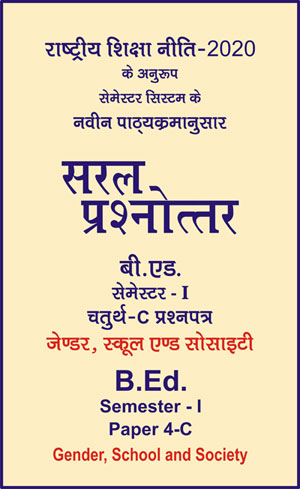|
बी एड - एम एड >> बी.एड. सेमेस्टर-1 प्रश्नपत्र-IV-C - जेण्डर, स्कूल एण्ड सोसाइटी बी.एड. सेमेस्टर-1 प्रश्नपत्र-IV-C - जेण्डर, स्कूल एण्ड सोसाइटीसरल प्रश्नोत्तर समूह
|
5 पाठक हैं |
||||||
बी.एड. सेमेस्टर-1 प्रश्नपत्र-IV-C - जेण्डर, स्कूल एण्ड सोसाइटी (अंग्रेजी भाषाा में)
Question- What is the contribution of teachers in character building of children?
Related Short Answer Questions
- Whose role in the socialization of children has been described as constructive?
- What is the primary responsibility of the teacher?
Answer -
Teachers are crucial for imparting education in the socialization of children. He / she occupies the main position in the classroom to create and maintain a stimulating environment. He/she plays multiple roles in shaping the personality of the children. The teacher contributes to the learning of children in the transmission of knowledge, dissemination of information, imparting values, modelling ideal behaviour, resolving conflicts, communicating positive expectations, etc.
Although the primary responsibility of a teacher is to communicate knowledge, the teacher is an active agent of socialization. Through continuous interaction during the teaching-learning process, an environment of trust is created in the classroom, where children can express their aspirations, share their experiences, communicate their fears and concerns and reach the solution.
As mentioned earlier, the teacher is involved in accepting the behaviour, roles and attitudes within the learning environment and the school. In the formative years, when children are at the elementary level, the bond between children and teachers is as close as that of their own parents. They see their teacher as a role model. The role of the teacher is no less important even in adolescence. Positive relationships with teachers during their turbulent years can reduce aggression and anxiety and guide them towards forward-looking behaviour. Studies show that emotionally supportive teachers encourage academic interest, motivation and positive self-concept, and help teens guide them through times of ‘stress and storm’.
The teacher influences both directly and indirectly. He / she may enhance the process of socialization in children by modelling behaviour, communicating expectations and reinforcing positive behaviour. The teacher has the ability to bring about desirable changes in behaviour as a facilitator of the socialization of the students in the learning environment. When she is / he is engaged in the socialization of the students, her / his role becomes even greater than that of the teacher.
The role of teachers as change agents is not limited to the school environment and their learners. It extends beyond the school boundary to the communities. Teachers can and should try to reach communities and create awareness about various aspects like healthy habits, child rights, girl child education, women empowerment, gender equality, environment protection, use of technology, peace, democracy and socialism etc.
However, it is easy to imagine that the teacher’s social relationship is one way or the other as a cause-effect relationship, as both constantly influence each other and socialize in mutual relations. It is often a great experience for teachers when their students come up with new and innovative ideas or find unique ways to reach solutions.
Nowadays, to handle the ‘new generation package’, the teacher needs to keep many skills in his possession. It is crucial that the teacher is impartial, democratic, sensitive to individual needs and capable of neutralizing gender stereotypes; adopt integrated behaviours, have opportunities to participate in different activities, have responsibility for caring for each other in the classroom and at home, stay connected with parents and caregivers, and support their students lead with sympathy and kindness.
|
|||||













